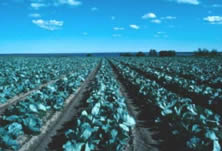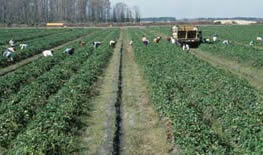|
Here at Grinning Planet, we know the difference between a myth and a rumor. A myth is that dragons once existed; a rumor is that Barney the Purple Dinosaur
 is thinking about making a career change to become Barney the Flaming Dragon.
is thinking about making a career change to become Barney the Flaming Dragon.
We also know that myths can strongly influence people's beliefs. When it comes to organic food and agriculture, we suddenly feel the need to unsheathe our double-edged pen and slay a few myths.
MYTH
Organic farming must be inefficient, since organic food is more expensive than regular food.
REALITY
Nearly all Western countries provide price supports for agriculture, and in the US these subsidies are overwhelmingly directed at conventional crops, not organic crops. Additionally, much of the agricultural infrastructure—cooperative extension services and agricultural research; transportation and storage systems for commodities; marketing mechanisms—all tilt heavily in favor of conventionally produced crops. If these disadvantages were removed, organic products would be reasonably close in price, and any remaining difference would be due to:
- the costs associated with organic certification, and
- the "externalities" of conventional agriculture—i.e. costs that are NOT included in the price of conventional agriculture's products, such as the ill effects on human health and the environment caused by the chemicals in our food and the pollution generated by conventional farming.
MYTH
An acre of organic agriculture can't produce as much food as an acre of conventional chemical-based farming.
REALITY
Research has shown that when acreage is first converted from conventional to organic, there is a temporary lowering of productivity. But over time, the natural fertility of the soil returns, and after three years or so, organic yields are equal to or superior to the prior yields from conventional crops. Think of the initial dip in productivity as withdrawal symptoms.
MYTH

The amount of pesticides in non-organic food is insignificant.
REALITY
Pesticide residues in food are limited by federal regulation. However, the US Environmental Protection Agency and Centers for Disease Control both released studies in 2003 indicating that the average American carries a "body burden" of chemical pesticides, and other studies have shown similar results. A University of Washington study found that children fed mostly organic produce and juice had only one-sixth the level of organophosphate pesticide byproducts in their urine compared to children who ate conventionally grown foods. The difference was statistically significant and meaningful to health:
- the children who ate conventional diets had levels above the amount considered to be "negligible risk" by the EPA;
- the children who ate mostly organic diets had levels BELOW the negligible-risk threshold.
MYTH
There is no nutritional difference between organic food and non-organic food.
REALITY
Chemical farming damages the natural fertility of soil because it kills or suppresses the beneficial soil organisms that help ensure the nutrient richness of soil. The soil on an organic farm is loaded with these beneficial organisms and is chock-full of micro-nutrients. The result is that organically grown plants are healthier and more resistant to disease, and the food from them is more nutrient-rich. Research done at the University of California at Davis found that organically grown berries, corn and vegetables have over 50% more antioxidants than the same conventional crops. (Antioxidants are nutrients important to avoiding cancer and maintaining good overall health.) Studies also suggest that organic foods are higher in a variety of minerals.
Organic farming also does not cause the many problems associated with modern conventional farming, such as groundwater and streams that become polluted with pesticides or rivers and bays that are dying from oxygen deprivation due to fertilizer runoff.
So, that should dispel some of the common misperceptions about organic agriculture and organic food. The really good news is the taste of organic food—most people think it has much more flavor than conventionally produced food. And just think about it: Do you really want your kids sticking non-organic french fries up their noses?
Get Grinning Planet free via email
|


